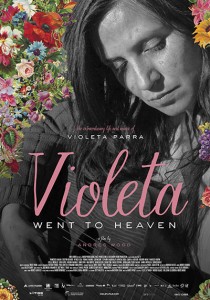VILLA: A LIVE STAGED READING
3:30 p.m. Bijou Art Cinemas FREE
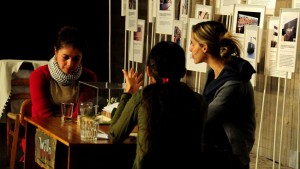
Chile, 2011
Playwright: Guillermo Calderón
Director: Tracy Cameron Francis
Translator: William Gregory
Dramaturg: Sarah Rose
Featuring Rebecca Lingafelter, Cristina Miles, Dana Millican
Running time: Approximately 70 minutes
Three Portland actors will perform a live staged reading of Guillermo Calderón’s Villa, in which three young women debate the future of the site of a former villa turned into a torture barracks by the military dictatorship. Originally performed inside the infamous Villa Grimaldi, this spare, intense play by one of Chilean theatre’s fiercest new literary voices grapples with the legacy of atrocity. Margaret Gray writes in the Los Angeles Times: “Calderón’s stark lyricism and dreamlike imagery recall the magical realism of Nabokov (Invitation to a Beheading). At the same time he keeps stripping away his own metaphors, fighting against the lure of lyricism, and it becomes clear that the women’s struggle is also his own: how to write a play about the villa? Will a work of theater, however nobly intentioned, diminish the pain of the victims?”
How should we commemorate past atrocity?
Join us for a staged reading (in English translation) of Guillermo Calderón’s acclaimed one-act play in which three young women debate the future of the site of a former villa turned into a torture barracks by the military dictatorship. Originally performed inside the infamous Villa Grimaldi, this “spare, intense” play grapples with the legacy of atrocity using “stark lyricism and dreamlike imagery” (LA Times). Featuring acclaimed Portland actresses Cristi Miles, Dana Millican (Portlandia), + Rebecca Lingafelter.
The 70-minute play will be followed by a discussion with playwright Guillermo Calderón, Prof. Tamara Lea Spira (Women’s and Gender Studies), and Amalia Gladhart (Romance Languages). Moderated by Ruth Wikler-Luker, Boom Arts/Portland.
Cosponsored with the Department of Theatre Arts.
VISUAL JUSTICE: DEMOCRATIZED VIDEO AS EVIDENCE
A talk by Kelly Matheson
5:00 p.m. Knight Law School 110 Free
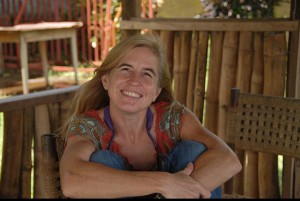 Kelly Matheson is the recipient of the first James Blue Award, presented by the James and Richard Blue Foundation, and a guest of the Wayne Morse Center for Law and Politics at the University of Oregon. Matheson serves as a senior attorney and program manager for WITNESS, an international human rights organization that specializes in using video to support change in human rights practice, policy, and law. Matheson will return to the UO School of Law, where she received her doctor of jurisprudence degree, to address how videos documenting injustices, captured on phones and other cameras by citizens who are often risking their lives, can be used as evidence in judicial proceedings and for human rights advocacy. She will present a number of case studies from Syria and other locations across the globe demonstrating how video has been used to secure prosecutions of the guilty or exonerations of the innocent.
Kelly Matheson is the recipient of the first James Blue Award, presented by the James and Richard Blue Foundation, and a guest of the Wayne Morse Center for Law and Politics at the University of Oregon. Matheson serves as a senior attorney and program manager for WITNESS, an international human rights organization that specializes in using video to support change in human rights practice, policy, and law. Matheson will return to the UO School of Law, where she received her doctor of jurisprudence degree, to address how videos documenting injustices, captured on phones and other cameras by citizens who are often risking their lives, can be used as evidence in judicial proceedings and for human rights advocacy. She will present a number of case studies from Syria and other locations across the globe demonstrating how video has been used to secure prosecutions of the guilty or exonerations of the innocent.
Cosponsored with the Good Works Film Festival.
VIOLETA WENT TO HEAVEN
6:45 p.m. Bijou Art Cinemas ![]()
WITH MORNING HEARTS
With filmmaker David MacDougall
7:30 p.m. Whitsell Auditorium, Portland Art Museum
India-Australia, 2001
Directed by: David MacDougall
Running Time: 110 minutes
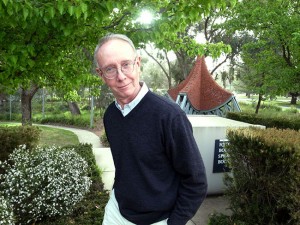 In recent years, the acclaimed ethnographic filmmaker David MacDougall has been drawn to India as a dominant focus, placing special emphasis on institutions for children and the experience of those growing up in them. His major work from this period is the “Doon School Chronicles,” a series of films shot at the eponymous and elite boarding school over the course of three years. One of India’s most highly regarded boarding schools for boys, the Doon School allowed MacDougall to film daily life in its classrooms and, more importantly, in the living quarters from 1997 to 2000. MacDougall’s patience resulted in a five-film cycle, including With Morning Hearts, following a group of boys through their first year in the school.
In recent years, the acclaimed ethnographic filmmaker David MacDougall has been drawn to India as a dominant focus, placing special emphasis on institutions for children and the experience of those growing up in them. His major work from this period is the “Doon School Chronicles,” a series of films shot at the eponymous and elite boarding school over the course of three years. One of India’s most highly regarded boarding schools for boys, the Doon School allowed MacDougall to film daily life in its classrooms and, more importantly, in the living quarters from 1997 to 2000. MacDougall’s patience resulted in a five-film cycle, including With Morning Hearts, following a group of boys through their first year in the school.
With great sensitivity to social, material, and aesthetic details and a keen eye for significant moments of interaction and emotion, With Morning Hearts focuses on a group of twelve-year-olds during their first year in one of the “houses” for new boys. The film explores the boys’ attachment to the house but, more importantly, their attachment to one another in a communal life. It follows, in particular, the experiences of one boy and several of his close associates, from their initial homesickness, to their life as members of the group, to their separation from the house at the end of the year.
Visual ethnographer Steef Meyknecht writes, “By giving us an intimate portrait of daily life at the Doon School, the film demonstrates the way in which leading Indian families try to reproduce their values in the next generation. With characteristic MacDougall framing, this well-structured film is proof of the filmmaker’s pleasure in his subject and the art of well-researched observational cinema.
EL TOPO
9:35 p.m. Bijou Art Cinemas ![]()
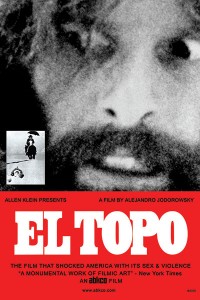
Mexico, 1971
Directed by: Alejandro Jodorowsky
Writer: Alejandro Jodorowsky
Editing by: Federico Landeros
Music by: Alejandro Jodorowsky, Nacho Méndez
Cast: Alejandro Jodorowsky, David Silva, Alfonso Arau, Mara Lorenzio
Running Time: 124 minutes
As stated by The Oregonian’s Shawn Levy, El Topo is “partly a revenge tale, partly a religious allegory, partly a spaghetti Western, partly a savage nightmare, and entirely, utterly unique.” Alejandro Jodorowsky’s legendary, notorious cult hit essentially created the genre of the midnight movie—a spectacle so stunning and bizarre that normal hours couldn’t contain it. Incorporating influences from tarot to the Bible to surrealism into a mind-blowing western, Jodorowsky cast himself as the leather-clad gunman, El Topo (“the mole”), who wanders through a desert strewn with mystical symbols on an unnamed quest, leaving blood and carnage in his wake. Declared a masterpiece by John Lennon himself, who helped the film get U.S. distribution, the film tops even the most outrageous aesthetic experiments of its radical era and remains unmatched in its provocations and strange beauty.
